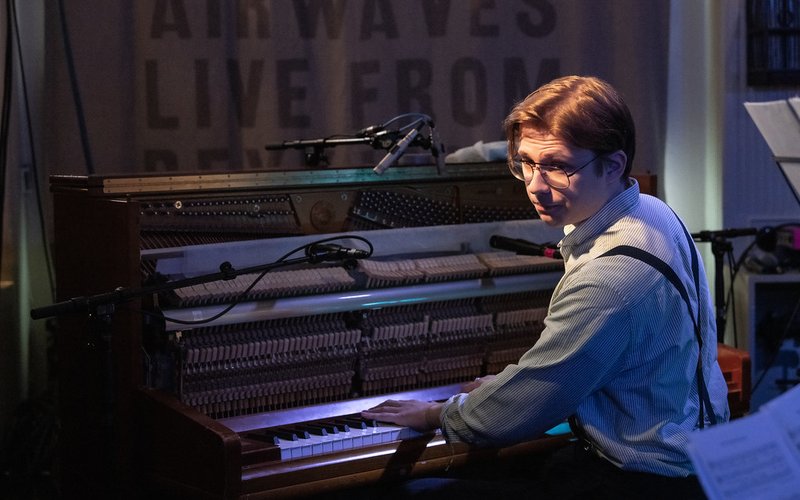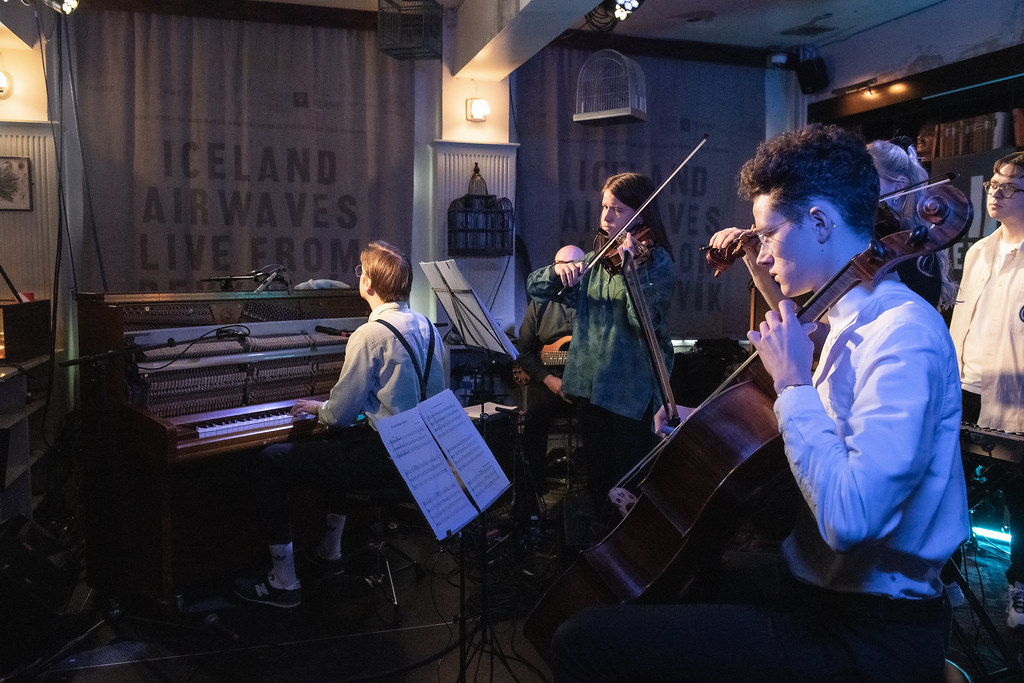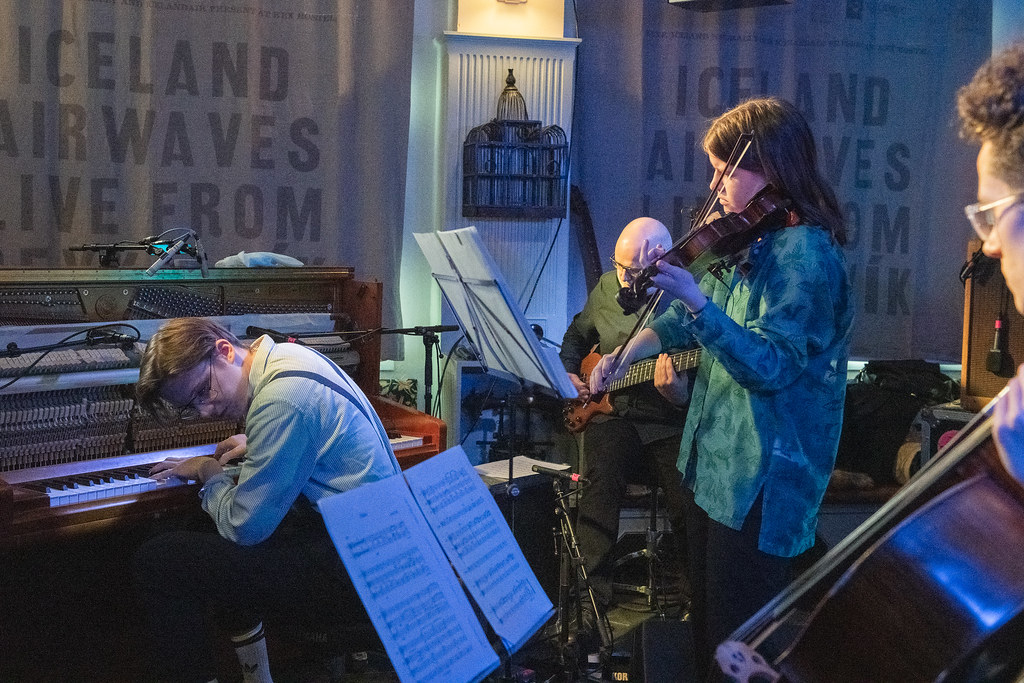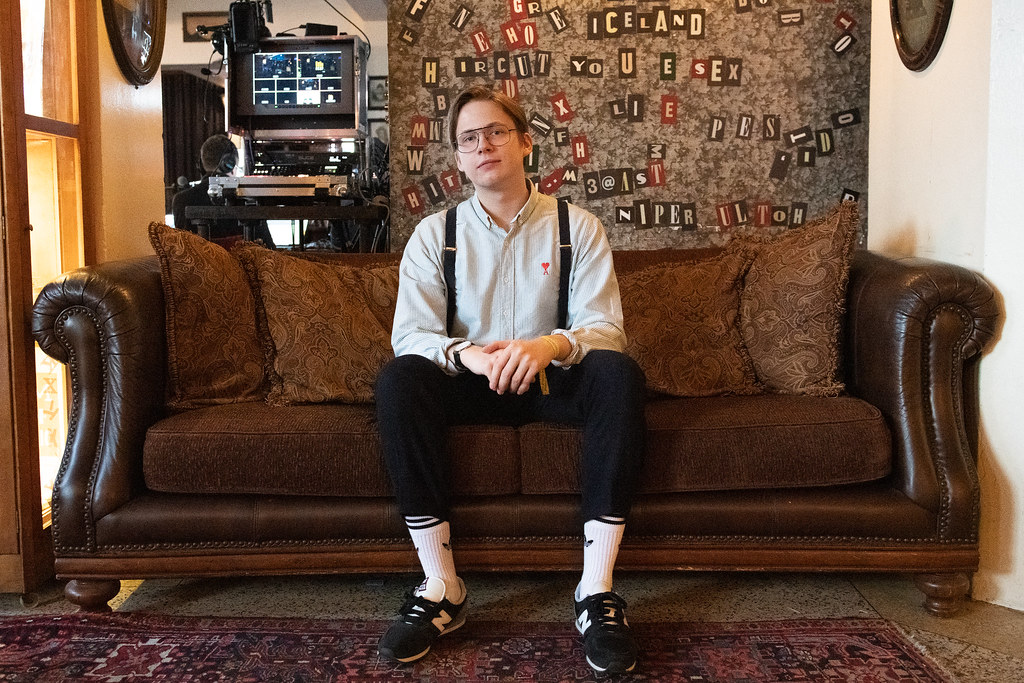
It’s not uncommon for parents to encourage their children to explore the piano at an early age, but few run with it like the way Icelandic composer Gabríel Ólafs has. Ólafs began playing when he was five years old and quickly took a liking to the instrument but over time began forging his own path.
While he was classically trained, he shirked tradition in favor of methods that allowed him self-expression through improvisation and study of jazz piano. Growing up in an isolated suburb of Reykjavik, he found music to be an escape in the country’s harsh and dark winter months. When he was 14-years-old, he composed what would be his first song, “Absent Minded.” Fast forward five years and the song would become the title track to his 2019 debut album.
Ólafs music is a tender extension of his imagination and a reflection of the world around him. He takes inspiration from his daily life – “Cyclist Waltz” being a theme written for a poster of a French cyclist in his home and “Floral Hymn” is an homage to his mother tending to her garden. Utilizing a felt-piano technique, his compositions take on a dreamlike, serene quality. As an avid fan of films and scores, the record plays out like a cinematic portrayal of the young artists’ life thus far.
When Ólafs performed at the Kex Hostel at Iceland Airwaves 2019, these inner worlds brimmed to life. Backed with an ensemble of string players, the delicate arrangements consumed the room. Hunched over the piano, Ólafs himself appeared to be consumed in the wordless stories within his melodies. Judging by the silence from the rest of the room, others were transported into his musical scenes as well.
After his performance, we talked with Ólafs about his artistic journey, his affection for and celebration of his imagination, and the methods behind his debut Absent Minded. Watch video from his Airwaves session and read the interview below.
KEXP: You started playing the piano when you were five years old. What brought you to that instrument at such a young age?
Gabríel Ólafs: It's really just the classic... Your parents take you to pick an instrument or something that you want to learn. It's very common in Iceland for every child to at least learn some instrument, to try if you want to learn it. Many people start out with the flutes. I dunno what it's called, like small flutes. I think [my parents] were thinking of like the cello or something and then I just tried the piano and I think instantly fell in love with the idea of being able to play songs that I hear on the radio or just for myself. And I just instantly was hooked.
It sounds like also from an early age, you saw the piano as a way to channel your imagination. Do you feel like you're drawn to more fantastical ideas? Or how does the piano help you get these ideas and imagination out?
I'm really into fantasies and what you can imagine – like the concept of your own imagination. For me, the piano – or just music – is probably the best way I can express that, really. And also just for me, just through the years, I think the piano has just been the main thing that's helped me when I'm overthinking things or if I'm emotionally in some state. [If] something is very complicated, the piano helps me think and sort of untangle those thoughts in my head.
While you were classically trained, you prefer to utilize nontraditional methods in your playing. Why is that?
I am classically trained, but I was never really a top classical pianist. I have to admit, you can ask my classical teachers. He was getting really annoyed with me when I was finishing because I always did sort of my own version of the piece. But that's not what you want. You do want to interpret it, but like interpret the piece you're doing, but I always did something that slightly wasn't how it was on the sheet music. That was kind of the reason I have never been really a fan of it. I could never be a classical pianist. Then also I learned jazz piano, which was more up my alley because the method that I use when I'm composing songs is improvisation. So I just sort of let the recording start and then I have an idea of what I'm gonna do and then I just sort of improvise. And that's more jazz, I think. That's more of an alternative method of playing rather than classical. But I am a fan of listening to classical music.

You also use a method called 'felt piano' where you put pieces of fabric between the hammers and strings of your piano. How did you come about this method and what do you like about that sound?
It's actually funny. I've always been sort of sensitive to loud noises, as a kid especially. I always practiced and played with the... in classical music you call it the rehearsal or the celeste pedal or whatever. You use it not to be loud when you're rehearsing. I think that's the main purpose of this pedal and why it's in so many upright pianos. So I've always been a fan of just playing that way and I've always played really soft. Many people have told me to play louder through the years. I have to say, the moment I sort of realized that it could be utilized this way in recordings is when I first heard, probably I was like 12 or something when I first heard a track by Nils Frahm, the German pianist. I think he is really the one who popularized the method. Like everyone else who did it after, I think they definitely were in some way influenced by Nils Frahm because he's the one that sort of took the felt piano and recorded it in this way which started, I think, just a whole almost new subgenre of neoclassical music.
You described your most recent album, Absent Minded, as a score to a non-existent film. What type of film would the album be and what story are you telling on the record?
This record is very personal to me. It's just stories from my life. This album really is just my youth because I've been composing the songs for this album since I was 14 until 19, that's when I finished writing all the songs. So for me, it's just the story of my youth and my home and my upbringing and my friends and events in my life. But if it were a score for a movie, I think it would be maybe... I mean, there could be many possibilities. I think it might be an autobiography of someone, like a biopic or something, or it could be like a fantasy or a drama of some kind or sci-fi or something.
Do you have aspirations to work in film?
Yeah, definitely. My dream would be to compose for film because I've always been a big fan of film and also filmmaking and editing. Ever since I was really small, I've always wanted to be a film score composer.

Talking about your upbringing, you've mentioned before that you live pretty far out and sort of isolated. Do you find music to be a comfort in that? How do you cope with feeling apart from other people?
I live in Reykjavik now, which is great. But yeah, I lived in this way too quiet suburb. It's really a suburb of Reykjavik, but it's like half an hour from where the people are, you know? So it's really quiet and really boring. Not much to do. And also, just living in Iceland, you know, you can maybe play outside a little less than other kids. You would have to stay inside and, I mean, you have to do something. And also it gets really dark. The winters get really dark. Every Icelander knows this, you might feel a bit sad in the winter because it happens to your body. when there's only darkness, you get kind of sad. Or not sad, more like things are sort of different for you. So I think those are definitely the things that did influence me and affect me. And I would say music is definitely a way to cope with that.
You've mentioned you've moved to Reykjavik now and you played [at Kex Hostel] with an incredible ensemble of musicians. You've played our broadcasts before in different acts. Is there a big neoclassical community here? And what's the music community like in Reykjavik for you?
I think it's wonderful. I'm a big fan of the musical community in Iceland. It's not maybe a big neoclassical community, but it's definitely there. And I think we think we have key artists who are very strong. Of course, we have Ólafur Arnalds and we have Hugar, the ambient band. Skúli [Sverrisson] who was playing with me, he's an amazing composer who helps people a lot. And countless more just brilliant producers and composers. Also, we have really good string players, like the people who play violin and cello here are great. The Icelandic symphony orchestra is really top-notch for a small country. I think that definitely helps the classical, neoclassical community. The best part about making music in Iceland, I think, is everyone knows everybody. So if you need some kind of microphone or anything, you could just call up someone. It's probably a friend of a friend that has this kind of compressor or microphone or something. So, yeah, I've really liked that. Everyone's just sort of on the same team here in Iceland.
You worked for about five years on your first record...
I composed the songs through the years. But I only worked on it for like two years.
Now that you've kind of seen these ideas through, where are you going next and what are you working on next?
I'm really excited. I'm working on another album, an LP, and I'm definitely going for a bit of a different sound. It's always going to be how I compose because I think that's your voice, how you compose melodies, but I thinking soundscaping wise in terms of audio, I think I might be going a little bit of a different route. Maybe something a little bit darker and more bass and maybe I'll explore some different themes.

Watch the band's performance from Iceland Airwaves 2019.
Watch the Icelandic band's performance from Kex Hostel Iceland Airwaves 2019 and read an exclusive interview .
Watch the Icelandic band's performance from Kex Hostel Iceland Airwaves 2019 and read an exclusive interview .